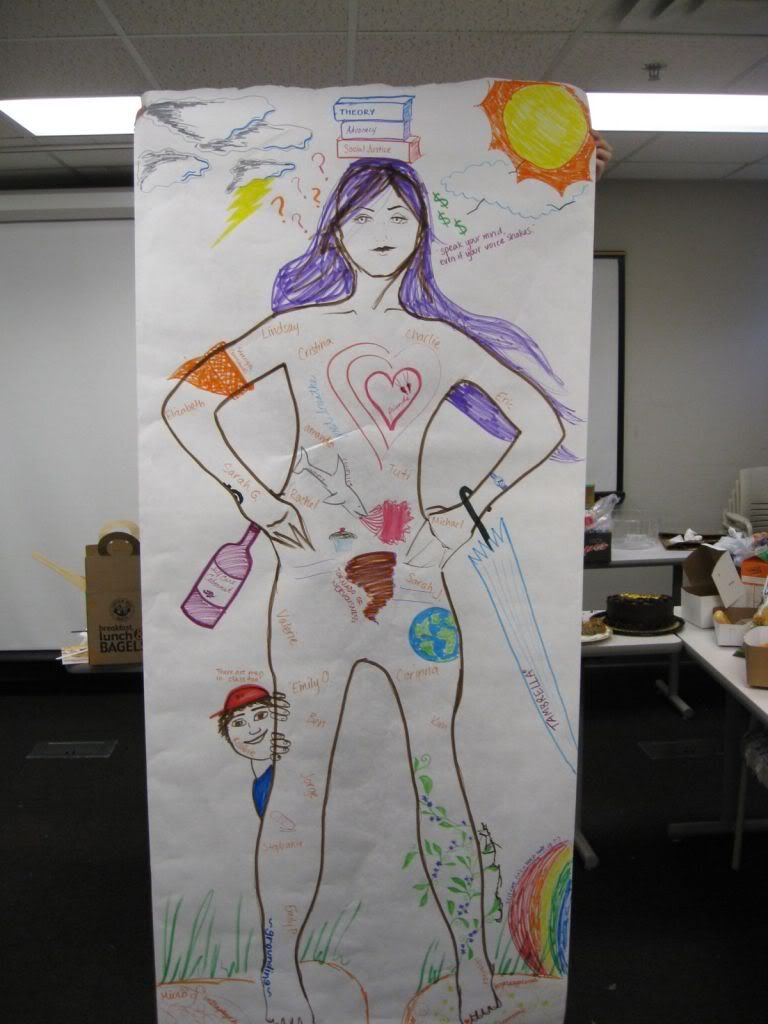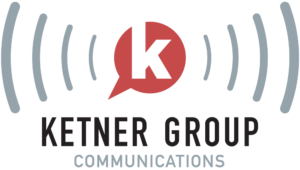 Photo: A body outline drawing of Valerie in which each piece of the drawing represents Valerie’s journey through the Social Work program.
Photo: A body outline drawing of Valerie in which each piece of the drawing represents Valerie’s journey through the Social Work program.
For those of you KbloG readers who don’t already know, I started working on my Master’s in Social Work last fall. It’s hard for me to believe that I only have NINE weeks of class left before I finish my last “real” courses and begin my final internship before my May 2012 graduation. Of course, as you know because you’re reading this blog post, I couldn’t bear to leave the awesome Ketner Group team so soon, so we’ve worked together to make it possible for me to “lead a double life” and do both. Even though there are few weeks in there that I’ve all but forgotten due to lack of sleep, I wouldn’t have changed a thing (short of altering the laws of time in which the day is 30 hours long – the parents are all nodding their heads in agreement!)
I could go on for way too long about the experiences I’ve had, but for the purposes of this post, I thought it would be fun to talk about a few of the things I’ve picked up in social work that I could see the PR world benefiting from. If I really sat down and thought about it for a while, it would be a LONG list – but as you can imagine, I’ve got studying to do, so let’s make it snappy!
“Yes…. and….” – My beloved first-year practice instructor, Tammy, drilled this one into us on day one, and we all thought it was kind of silly, but now, I try to drill it into anyone I catch making a “yes…., but” statement. We’re humans. We love to think we’re right, and we love to argue. But it can get pretty obnoxious when you’re talking with someone and they keep pretending to agree with you at first, then negating exactly what you said with their “Yeah that’s true but I mean….” statements. Being on the receiving end of these comments is no fun, and it happens more than we realize – oh, until now, because you’ll start realizing it all the time. So what’s the alternative? The more positive and respectful “yes, AND” statement. What I didn’t know until I Googled this just now is that it’s also an improv comedy technique, which makes total sense! No one wants to watch an improv skit where the comedians can’t let go of their preconceived ideas or egos rather than playing off what’s going on in the moment. Check out this awesome eHow video that demonstrates this concept in the improv context. Next time you’re in a conversation that has potential for conflict, try to remember “yes, AND” – and you might be surprised at how much power it has to keep the tone of the conversation positive. (Also, remember that it doesn’t have to be literally “yes, but” or “yes, and,” as a lot of time it’s just the juxtaposing of agreeing with an idea “to be polite” and then negating it, without the actual word “yes.”)
Negative Interactional Cycles – Oh goody, this one comes from my Couples Counseling class this semester! It’s one of the core concepts of Emotion Focused Therapy, and I’ll avoid boring you with all the details, but one of the main ideas is that sometimes it’s not as much about the CONTENT of the interaction as it is the PROCESS of the interaction and the underlying emotions. I think it’s fairly common for negative interactional cycles to form between co-workers (it ain’t called “work spouse” for nothing!), which could certainly extend to interactions between the PR agency and the client – and no one wants that. Once the interaction cycles are entrenched, the content seems to matter far less than the process (which includes underlying motivations, feelings, and interpretations). And at some point, the negativity becomes unsolvable if you only address the content and not the underlying stuff. If you feel trapped in a negative interaction cycle with someone in your work or personal life, I encourage you to read up on EFT, because it IS possible to deescalate these cycles and replace them with positive ones – but it doesn’t happen automatically.
Self-care, self-care, self-care – Okay, this one is kind of cheating (in that it is not at all unique to social work), but it is a concept that is heavily stressed in social work and other helping professions. Self-care is a must because you’re dealing not only the long hours, but also the “compassion fatigue” of working with heavy stuff all day long. We all know self-care is important, and yet we continue to put it on the back burner. At Ketner Group, we are extremely fortunate to have built a culture that values self-care and family life, but I know that it can seem like a foreign concept in the fast-moving business world, especially in the high pressure, high stakes environments of large, corporate PR firms where people are lucky to get home by 7 or 8 pm. Please remember that you cannot be truly happy in life if you’re not taking care of yourself. I know that promotion is dangling like a carrot in front of you; if you sacrifice your wellbeing for it, then what? And on that note, check out Ariana Huffington’s four-minute TED Talk on How to Succeed – I think you’ll be surprised.
If you’ve got any great, unusual tips on surviving and thriving in the PR world (or the business world in general), we’d love to hear them in the comments!
